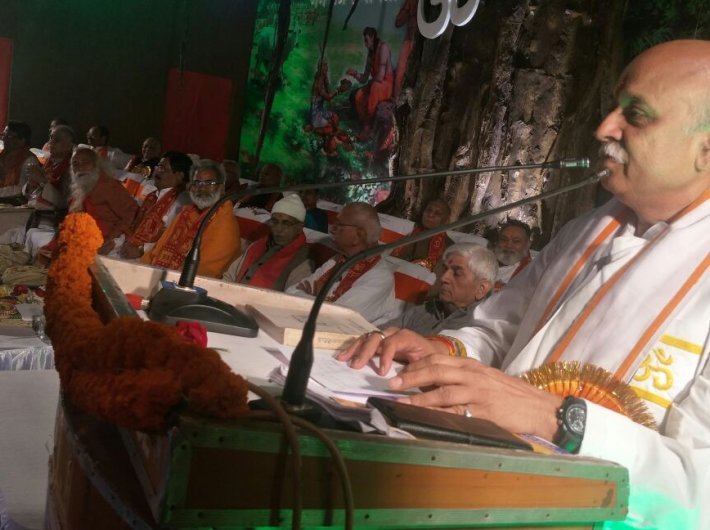The VHP leader’s rant and the saffron family’s art of managing two kinds of dissents
Vishwa Hindu Parishad (VHP) working president Pravin Togadia is in the news after a long time. This week, Togadia went 'missing' for an entire day as the Gujarat and Rajasthan police were on the lookout for him, arrest warrant in hand. Togadia was later brought to a hospital in an unconscious state. At a press conference later, an emotional Togadia claimed there was a threat to his life.
A tearful Togadia may appear to be a treat for the incorrigible doomsayers for Indian democracy. They may find solace in his rant and offer it as a pathological proof of democratic decay. But hold your horses if you really want to know the issue and its likely fallout.
The situation Togadia found himself in — his state of mind and the run-ins with the Narendra Modi government — didn't happen overnight. For the past decade, Togadia has been taking up cudgels in the name of Hindus against BJP leaders such as Atal Bihari Vajpayee, LK Advani and Narendra Modi. In the process, Togadia fell by the wayside — in the Sangh Parivar's scheme of things — even before the emergence of Narendra Modi on the national stage as the BJP's numero uno.
Togadia has been isolated within the Sangh Parivar for a long time. The days when he was considered a rising star of Hindutva are long past. The oncologist-turned-rabble rouser was once known for his incendiary speeches through which he mobilised the masses. During the 90s, Togadia was given more prominence than the then VHP chief Ashok Singhal (even though his behaviour was frowned upon and Singhal was much respected within the saffron fold due to his conformist approach).
In fact, Togadia remaining in the VHP, and that too at its helm, despite his eccentric conduct, indicates the organisational flexibility within the saffron fold. Though feuds regularly occur within the Sangh Parivar (no different from any other organisation), its ability to manage the rebellion and insulate itself from harm is unique.
To make sense of Togadia's actions and its implications, examining a history of such feuds can be instructive: Within the RSS, Dattopant Thengadi, founder of the RSS' trade union arm Bhartiya Mazdoor Sangh (BMS), is revered. Thengadi single-handedly raised a powerful trade union in the face of tough competition from Left-inspired unions such as Centre of Indian Trade Unions (CITU), All India Trade Union Congress (AITUC) and the Indian National Trade Union Congress (INTUC).
Thengadi had a bitter falling out with the NDA government led by Vajpayee and then home minister Advani. The relations soured to the extent that Thengadi refused to talk to either of them. But Thengadi remained in touch with Advani's wife Kamla. Despite the bitterness in their relationship at work, familial ties remained intact. Similarly, Vajpayee held Thengadi in high regard despite the latter’s occasional outburst against his leadership.
Singhal too, was bitter about Advani and maintained a discreet distance from him when Advani assumed the role of BJP president in 2005. Yet, Advani always maintained that he held Singhal in high esteem. The apparent reason for personal respect between them was that they were groomed in the Sangh discipline which forbade a public spat or an ugly spectacle. No doubt, in private, Singhal voiced outrage but avoided its expression in public. This is precisely why Thengadi and Singhal are respected and placed in the pantheon of Sangh Parivar leaders.
Contrast this with leaders such as KN Govindacharya, Uma Bharti and Kalyan Singh who came from the Sangh Parivar school but crossed the Rubicon of discipline and fell by the wayside. Though Govindacharya was critical of the BJP, he avoided climbing over the other side of the fence. Singh and Bharti tried their luck elsewhere, but ultimately returned to the fold in a much weaker position. Ironically, none of them proved to be effective when they launched their campaigns against the RSS-BJP combine. They returned only after realising that their efforts were futile.
Togadia has been following the same trajectory. Unlike Singhal, who never nursed political ambitions, Togadia tried to have a say in Gujarat politics. When Togadia found Modi a tough opponent, he mobilised the VHP to oppose the then Gujarat chief minister. In all state elections since 2002, Togadia pulled political strings through his caste association (he is a Patel) to undercut Modi. In the 2007 and 2012 elections, he indirectly lent support to the Congress even when he was cautioned by top leaders of the RSS-VHP. It appeared as if he and a handful of supporters were waging a lonely battle.
In this entire episode, what is more important than Togadia’s conduct is the remarkable flexibility shown by the saffron fold in letting him continue as VHP chief. Though his stature has been considerably undermined within the organisation, his official position remains intact. The saffron family leadership has silently put up with his sulking and often rebellious conduct. Because nobody knows better than the Sangh Parivar that a rebellious Togadia may make a few headlines, but would ultimately prove a liability for its adversaries.
[This comment has appeared on FirstPost.com]

